Unit1-Unit6期中复习课件49张2021-2022学年人教版英语七年级下册
文档属性
| 名称 | Unit1-Unit6期中复习课件49张2021-2022学年人教版英语七年级下册 |
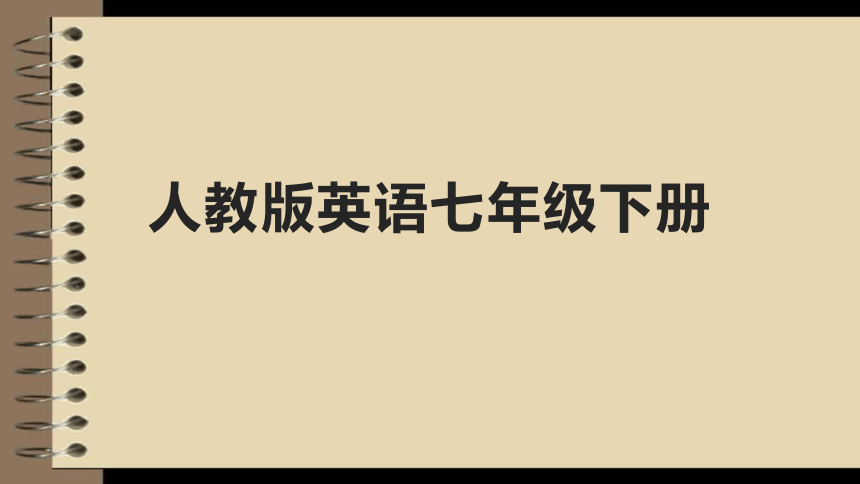
|
|
| 格式 | pptx | ||
| 文件大小 | 251.1KB | ||
| 资源类型 | 教案 | ||
| 版本资源 | 人教新目标(Go for it)版 | ||
| 科目 | 英语 | ||
| 更新时间 | 2022-04-02 17:52:01 | ||
图片预览

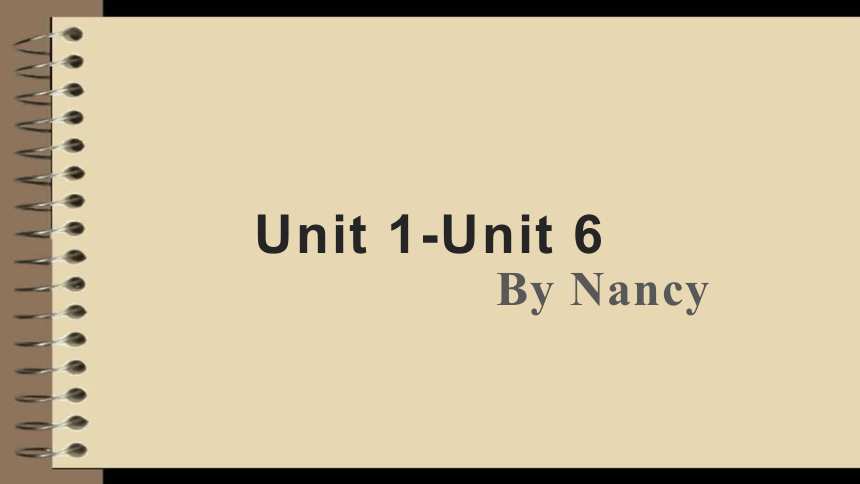
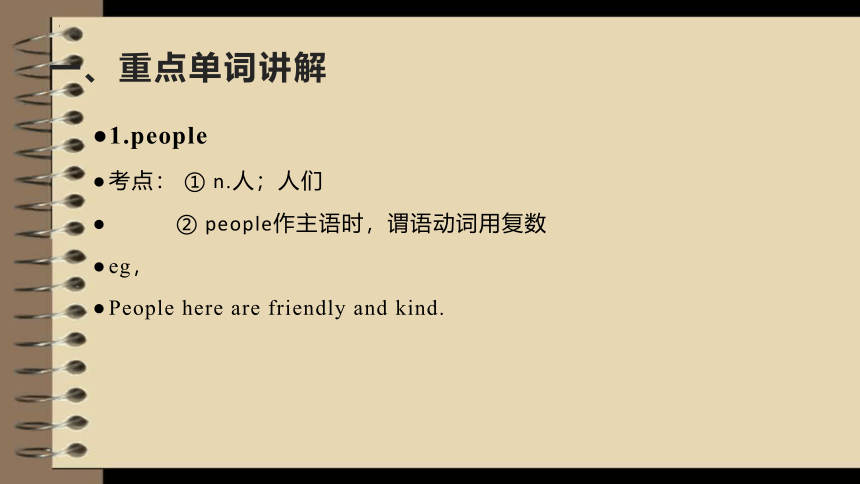
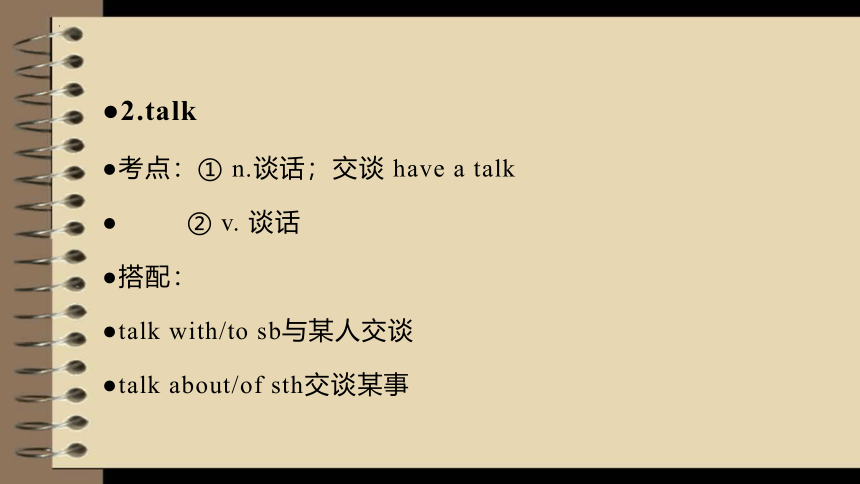
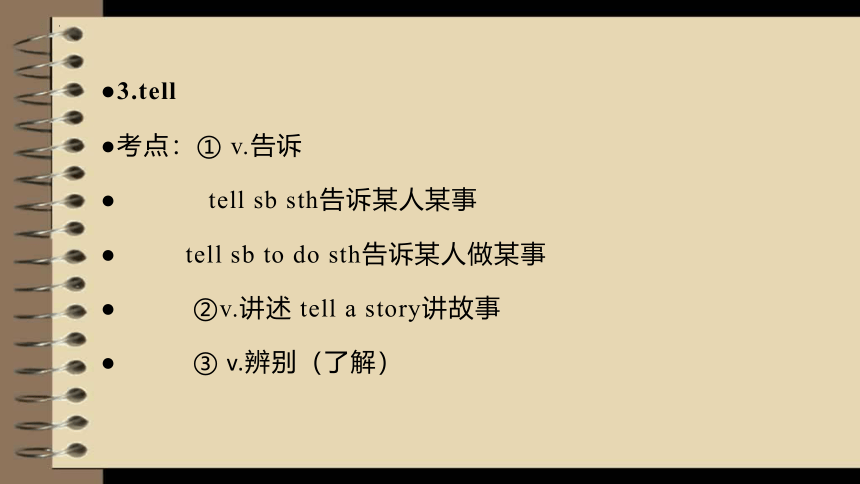
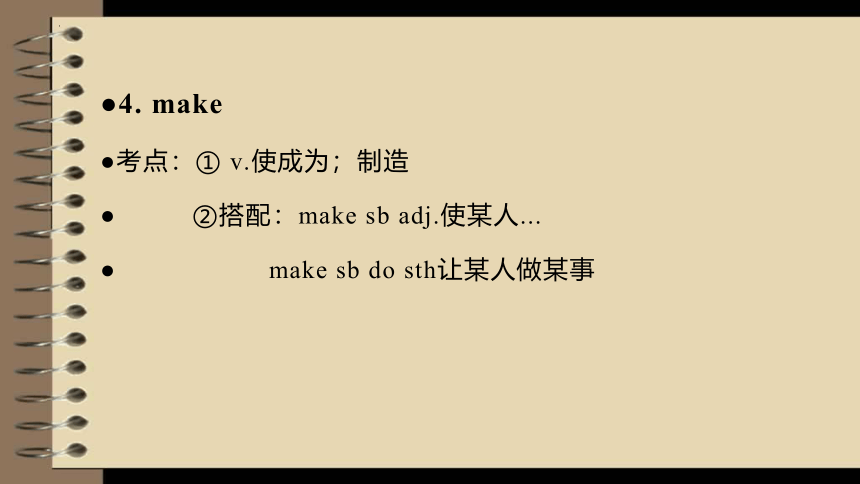
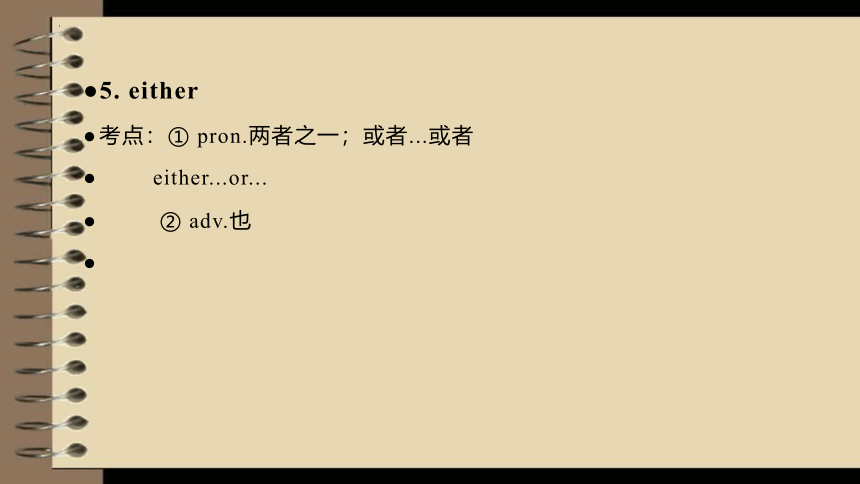
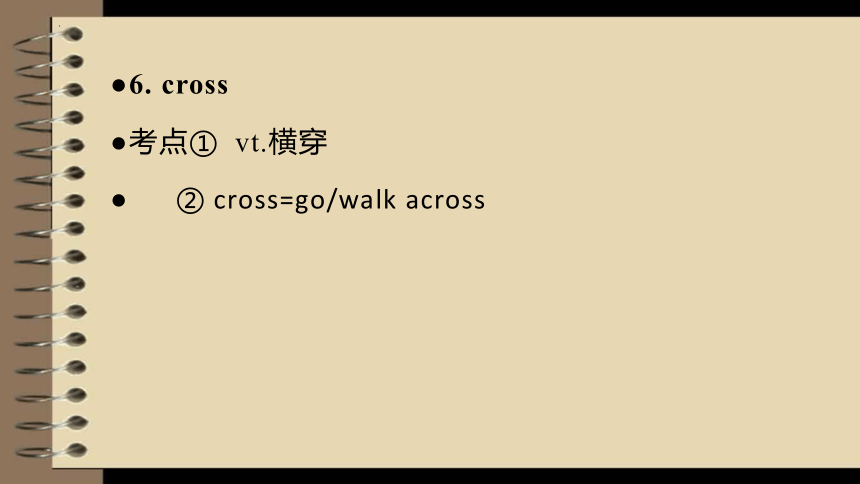
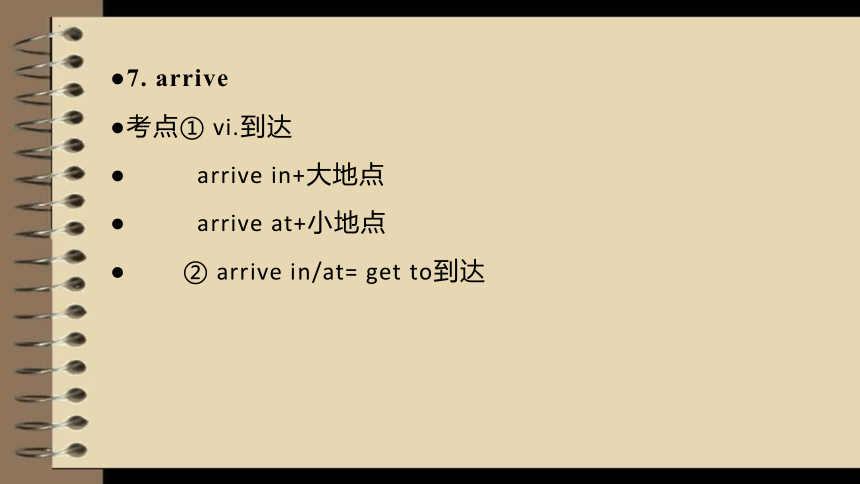
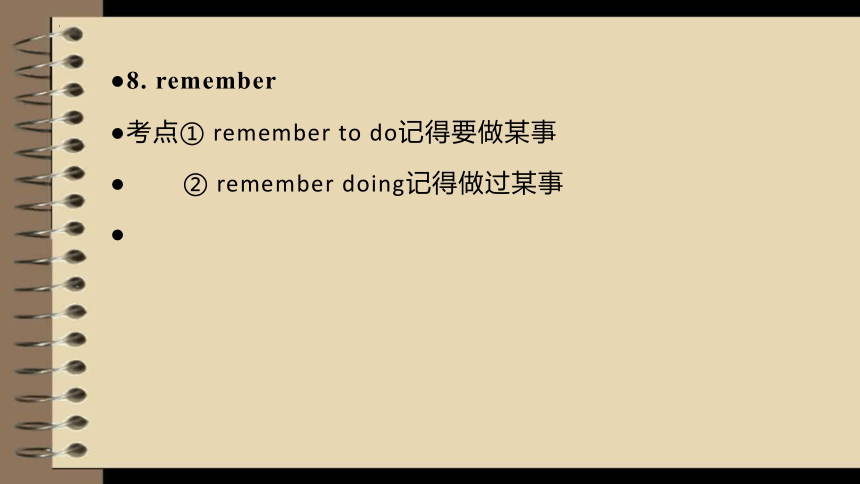
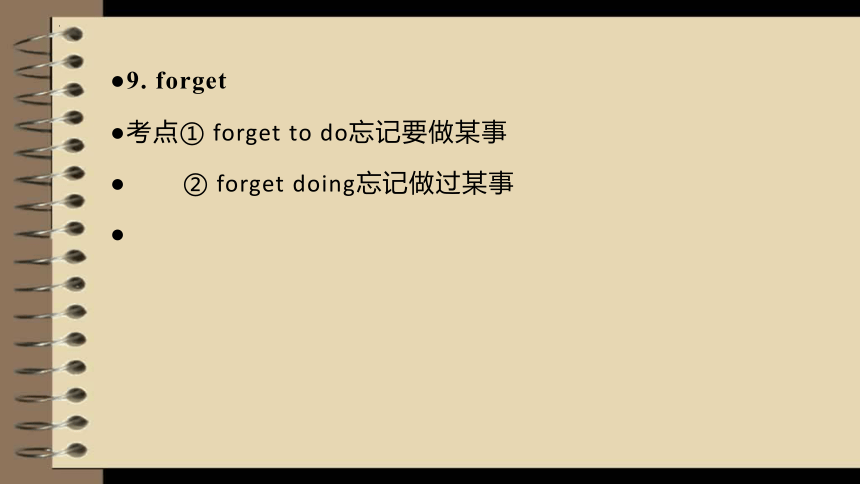
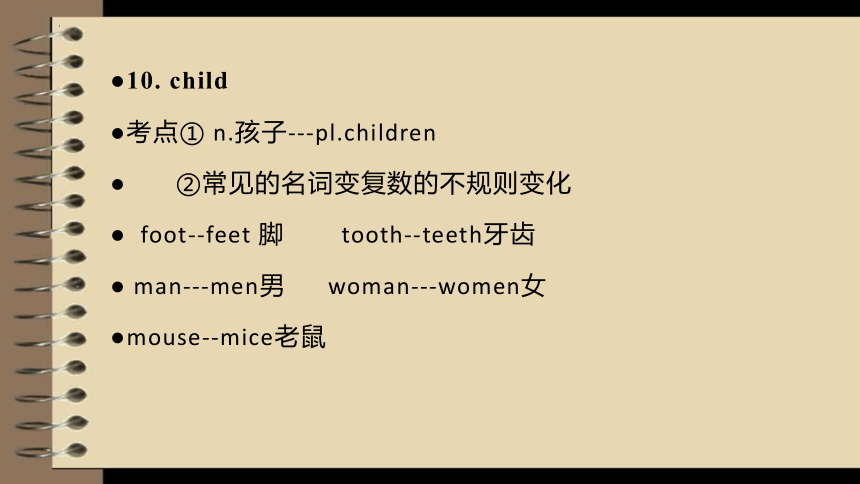
文档简介
(共49张PPT)
人教版英语七年级下册
Unit 1-Unit 6
By Nancy
一、重点单词讲解
1.people
考点: ① n.人;人们
② people作主语时,谓语动词用复数
eg,
People here are friendly and kind.
2.talk
考点:① n.谈话;交谈 have a talk
② v. 谈话
搭配:
talk with/to sb与某人交谈
talk about/of sth交谈某事
3.tell
考点:① v.告诉
tell sb sth告诉某人某事
tell sb to do sth告诉某人做某事
②v.讲述 tell a story讲故事
③ v.辨别(了解)
4. make
考点:① v.使成为;制造
②搭配:make sb adj.使某人...
make sb do sth让某人做某事
5. either
考点:① pron.两者之一;或者...或者
either...or...
② adv.也
6. cross
考点① vt.横穿
② cross=go/walk across
7. arrive
考点① vi.到达
arrive in+大地点
arrive at+小地点
② arrive in/at= get to到达
8. remember
考点① remember to do记得要做某事
② remember doing记得做过某事
9. forget
考点① forget to do忘记要做某事
② forget doing忘记做过某事
10. child
考点① n.孩子---pl.children
②常见的名词变复数的不规则变化
foot--feet 脚 tooth--teeth牙齿
man---men男 woman---women女
mouse--mice老鼠
11. wish
考点① n.祝愿;祝福
Best wishes!
②v.祝福;祝愿
wish sb sth祝福某人...
wish sb to do sth祝愿某人做某事
12. keep
考点① v.保持;保留
②固定搭配
keep sb /sth+adj 保持...
keep sb doing 让某人一直做某事
keep doing 保持做某事
二、重点短语
1.play the +西洋乐器 弹/拉 play+球类/棋类 打/踢
2.be good at...=do well in 擅长
3.be good with...善于应付...
4.think of 认为;想出
5.make friends with...与...交朋友
6.tell sb. (not )to do sth. 叫某人(不)做某事
7.talk to/with sb与某人交流
talk about/of sth谈论某事
8.show sb sth=show sth to sb向某人展示某物
9.help sb do sth帮助某人做某事
help sb with sth帮助某人某事
10.take/have a shower洗澡
11.on weekends= on the weekend在周末
12.do one’s homework做家庭作业
13.a lot of= lots of许多;大量
14.be late for...迟到
15.It takes sb +一段时间 to do sth花某人多少时间做某事
16.take a /the bus/train/subway/car乘坐公交车/火车/地铁/小车
17.every day每天
18.between...and...在...之间
19.cross the street过街
20.be afraid of sth害怕某物
be afraid to do sth害怕做某事
21.arrive in/at...到达=get to...
22.listen to...听...
23.be sorry for...对...感到抱歉
24.keep quiet保持安静
keep doing保持做某事
25.It’s important for sb to do sth对某人来说做某事很重要
26.practice doing练习做某事
27.be strict with sb对某人严格
28.follow the rules遵守规则
29.learn to do学会做某事
30.kind of有点+形容词/副词
31.a kind of一种....
32.wish sb sth祝某人...
wish sb to do sth希望某人做某事
33.get/be lost迷路
34.be in danger处于危险之中=be dangerous
35.cut down砍到
36.be made of 由...制成(看得出原材料)
37.read a newspaper读报纸
38.go to the movies看电影
39.a symbol of... ....的象征/符号
三、重点知识点
1.join/join in/be in
join+俱乐部/政党/人
join in+活动/比赛
be in(表加入之后的状态,有延续性)
2. look/read/see/watch四个看
see看见,表示结果;see a movie看电影
look看起来,后面跟形容词,look at 看...
watch观看 watch TV看电视
read阅读理解,read books/newspaper看书/报纸
3. speak/tell/say/talk四个说
speak+语言,speak English/Japanese
talk谈论,talk to/with sb 与某人谈论talk about sth谈论某事
tell告诉,tell sb sth告诉某人某事,tell sb to do sth告诉某人做某事
tell a story/stories讲故事
say+说话的内容,强调说话的内容
4. either/too/also三个也
also.位于句中,be动词/情态动词之后,实义动词之前
too,位于肯定句句末,且用逗号隔开
either, 位于否定句句末,且用逗号隔开
三、语法点
1. 数字hundred百, thousand千,million百万,billion十亿
若前面若有具体数字,后面不加s, 不加of.
若前面若没有具体数字,后面需要加s,也需要加of.
2.时间的逆读法
①当分钟数小于等于30时,分钟数+past+小时
6:30 half past six
②当分钟数大于30时,(60-分钟数)+to+(小时+1)
7:45 a quarter to eight
3. 特殊疑问词
How,如何;怎样, 对方式/程度提问
How far,多远,对距离提问
How long,多久,对时间段提问
What,什么,对指物的名词或者动作提问
Why, 为什么,对原因提问
4. 交通方式的表达
动词短语的表达 介词短语的 表达
乘坐 take the/a bus.. by bus/subway/train/car/bike
骑 ride a bike/horse in/on+a/the bus/train/
走路 walk on foot
考点:两者可以进行转换
eg,
He goes to work by car.
=He drives a car to work.
5. 祈使句
祈使句是用来表示请求、命令、叮嘱、邀请、劝告或祝愿等的句子。它的特点是通常省略主语you, 以动词原形开头,末尾可用句号或感叹号。
结构:
肯定句① Be+形容词 / 名词 Be quiet!
②Do+其他 Finish it today, please!
③ Let+sb do sth Let us go!
否定句 ① No+doing禁止做某事 No parking!
② Don’t be/do sth! Don’t eat in class!
考点:①祈使句与陈述句的并列使用
祈使句and/or+句子
Study hard, and you will catch up with the class.
② 同义句转换
You mustn’t be noisy in class.
=Don’t noisy in class!
6. 现在进行时
定义:现在或现阶段正在进行的动作
常用的时间状语:now, at the moment, look, listen等。
谓语动词形式:
肯定句:be(am/is/are)+v.-ing形式
(2)否定句:主语+be(am/is/are)+not+v.-ing形式
(3)一般疑问句及回答Is/ Are+主语+doing...
(4)特殊疑问句:What...+is/are+主语+...?
动词的ing形式变化规则
(1) 一般情况,在动词后直接加ing
(2)以不发音的e结尾的,去e+ing
(3)以重读闭音节结尾的,双写末尾的辅音字母,再加ing
(4)以ie结尾的,把ie变成y,再加ing
五、相关练习题
(一)单项选择
1. Han Qing usually plays soccer after school.
A. a B. an C. the D. \
2. Tom usually goes fishing _____ Sunday morning.
A. at B. on C. for D. in
3. The building has ____ floors. They live on the ____ floor.
A. twelve; twelve B. twelfth; twelfth
C. twelfth; twelve D. twelve; twelfth
4. My father is always _______. He has no time to help with my homework.
A. smart B. busy
C. kind D. careful
5.— What does Tony like
- He likes basketball, so he often it in the afternoon.
A. to play, playing B. playing, to play
C. playing, plays D. plays, to play
6. — Excuse me. Where is Chongqing Bank
— It’s the supermarket and the post office.
A. between B. among C. on D. from
7.The movie is boring. We don t want to go and see it.
A. a kind of B. kinds of C. kind of D. of kind
—Can we ask Mike to play basketball with us
— No, he a basketball game on TV.
A is watching B. watches C. watching D. watch
9.She is so lazy. She wants her mother everything for her.
A. to do B. do C. doing D. does
10. — does your brother work
— He works at a TV station.
A. How B. What C. Which D. Where
(二)完成句子
1. The boy is playing basketball.(改为否定句)
The boy basketball.
2. Tom sometimes walks to school. (同义转换)
Tom sometimes goes to school .
isn’t
playing
on
foot
3. Linda’s mother works as an English teacher.(改为一般疑问句)
Linda‘s father as an English teacher
4. There are some flowers on the teacher s desk.(改为否定句)
There flowers on the teacher s desk.
Does
work
aren’t
any
(三)用单词的适当形式填空
1. I feel (relax) When I listen the light music.
2. Look! Some girls (lie) on the beach.
3. Neither elephants nor lions ______(be) safe all the time.
4. You should stop _____(talk ) when you get into the library.
5. Our teachers make classroom rules______(keep) the classroom clean.
relaxed
are lying
are
talking
to keep
6. I like _____ _(play) the drums.
7. Your mother is tired today. Don’t make her ___ __(cook)this evening.
8. How often do you brush your ____ __(tooth)
9. It’s time for me ___ __(eat) breakfast.
10. Don’t forget ___ __(take) your umbrella with you. It seems to rain.
playing
cook
teeth
to eat
to take
谢谢大家!
人教版英语七年级下册
Unit 1-Unit 6
By Nancy
一、重点单词讲解
1.people
考点: ① n.人;人们
② people作主语时,谓语动词用复数
eg,
People here are friendly and kind.
2.talk
考点:① n.谈话;交谈 have a talk
② v. 谈话
搭配:
talk with/to sb与某人交谈
talk about/of sth交谈某事
3.tell
考点:① v.告诉
tell sb sth告诉某人某事
tell sb to do sth告诉某人做某事
②v.讲述 tell a story讲故事
③ v.辨别(了解)
4. make
考点:① v.使成为;制造
②搭配:make sb adj.使某人...
make sb do sth让某人做某事
5. either
考点:① pron.两者之一;或者...或者
either...or...
② adv.也
6. cross
考点① vt.横穿
② cross=go/walk across
7. arrive
考点① vi.到达
arrive in+大地点
arrive at+小地点
② arrive in/at= get to到达
8. remember
考点① remember to do记得要做某事
② remember doing记得做过某事
9. forget
考点① forget to do忘记要做某事
② forget doing忘记做过某事
10. child
考点① n.孩子---pl.children
②常见的名词变复数的不规则变化
foot--feet 脚 tooth--teeth牙齿
man---men男 woman---women女
mouse--mice老鼠
11. wish
考点① n.祝愿;祝福
Best wishes!
②v.祝福;祝愿
wish sb sth祝福某人...
wish sb to do sth祝愿某人做某事
12. keep
考点① v.保持;保留
②固定搭配
keep sb /sth+adj 保持...
keep sb doing 让某人一直做某事
keep doing 保持做某事
二、重点短语
1.play the +西洋乐器 弹/拉 play+球类/棋类 打/踢
2.be good at...=do well in 擅长
3.be good with...善于应付...
4.think of 认为;想出
5.make friends with...与...交朋友
6.tell sb. (not )to do sth. 叫某人(不)做某事
7.talk to/with sb与某人交流
talk about/of sth谈论某事
8.show sb sth=show sth to sb向某人展示某物
9.help sb do sth帮助某人做某事
help sb with sth帮助某人某事
10.take/have a shower洗澡
11.on weekends= on the weekend在周末
12.do one’s homework做家庭作业
13.a lot of= lots of许多;大量
14.be late for...迟到
15.It takes sb +一段时间 to do sth花某人多少时间做某事
16.take a /the bus/train/subway/car乘坐公交车/火车/地铁/小车
17.every day每天
18.between...and...在...之间
19.cross the street过街
20.be afraid of sth害怕某物
be afraid to do sth害怕做某事
21.arrive in/at...到达=get to...
22.listen to...听...
23.be sorry for...对...感到抱歉
24.keep quiet保持安静
keep doing保持做某事
25.It’s important for sb to do sth对某人来说做某事很重要
26.practice doing练习做某事
27.be strict with sb对某人严格
28.follow the rules遵守规则
29.learn to do学会做某事
30.kind of有点+形容词/副词
31.a kind of一种....
32.wish sb sth祝某人...
wish sb to do sth希望某人做某事
33.get/be lost迷路
34.be in danger处于危险之中=be dangerous
35.cut down砍到
36.be made of 由...制成(看得出原材料)
37.read a newspaper读报纸
38.go to the movies看电影
39.a symbol of... ....的象征/符号
三、重点知识点
1.join/join in/be in
join+俱乐部/政党/人
join in+活动/比赛
be in(表加入之后的状态,有延续性)
2. look/read/see/watch四个看
see看见,表示结果;see a movie看电影
look看起来,后面跟形容词,look at 看...
watch观看 watch TV看电视
read阅读理解,read books/newspaper看书/报纸
3. speak/tell/say/talk四个说
speak+语言,speak English/Japanese
talk谈论,talk to/with sb 与某人谈论talk about sth谈论某事
tell告诉,tell sb sth告诉某人某事,tell sb to do sth告诉某人做某事
tell a story/stories讲故事
say+说话的内容,强调说话的内容
4. either/too/also三个也
also.位于句中,be动词/情态动词之后,实义动词之前
too,位于肯定句句末,且用逗号隔开
either, 位于否定句句末,且用逗号隔开
三、语法点
1. 数字hundred百, thousand千,million百万,billion十亿
若前面若有具体数字,后面不加s, 不加of.
若前面若没有具体数字,后面需要加s,也需要加of.
2.时间的逆读法
①当分钟数小于等于30时,分钟数+past+小时
6:30 half past six
②当分钟数大于30时,(60-分钟数)+to+(小时+1)
7:45 a quarter to eight
3. 特殊疑问词
How,如何;怎样, 对方式/程度提问
How far,多远,对距离提问
How long,多久,对时间段提问
What,什么,对指物的名词或者动作提问
Why, 为什么,对原因提问
4. 交通方式的表达
动词短语的表达 介词短语的 表达
乘坐 take the/a bus.. by bus/subway/train/car/bike
骑 ride a bike/horse in/on+a/the bus/train/
走路 walk on foot
考点:两者可以进行转换
eg,
He goes to work by car.
=He drives a car to work.
5. 祈使句
祈使句是用来表示请求、命令、叮嘱、邀请、劝告或祝愿等的句子。它的特点是通常省略主语you, 以动词原形开头,末尾可用句号或感叹号。
结构:
肯定句① Be+形容词 / 名词 Be quiet!
②Do+其他 Finish it today, please!
③ Let+sb do sth Let us go!
否定句 ① No+doing禁止做某事 No parking!
② Don’t be/do sth! Don’t eat in class!
考点:①祈使句与陈述句的并列使用
祈使句and/or+句子
Study hard, and you will catch up with the class.
② 同义句转换
You mustn’t be noisy in class.
=Don’t noisy in class!
6. 现在进行时
定义:现在或现阶段正在进行的动作
常用的时间状语:now, at the moment, look, listen等。
谓语动词形式:
肯定句:be(am/is/are)+v.-ing形式
(2)否定句:主语+be(am/is/are)+not+v.-ing形式
(3)一般疑问句及回答Is/ Are+主语+doing...
(4)特殊疑问句:What...+is/are+主语+...?
动词的ing形式变化规则
(1) 一般情况,在动词后直接加ing
(2)以不发音的e结尾的,去e+ing
(3)以重读闭音节结尾的,双写末尾的辅音字母,再加ing
(4)以ie结尾的,把ie变成y,再加ing
五、相关练习题
(一)单项选择
1. Han Qing usually plays soccer after school.
A. a B. an C. the D. \
2. Tom usually goes fishing _____ Sunday morning.
A. at B. on C. for D. in
3. The building has ____ floors. They live on the ____ floor.
A. twelve; twelve B. twelfth; twelfth
C. twelfth; twelve D. twelve; twelfth
4. My father is always _______. He has no time to help with my homework.
A. smart B. busy
C. kind D. careful
5.— What does Tony like
- He likes basketball, so he often it in the afternoon.
A. to play, playing B. playing, to play
C. playing, plays D. plays, to play
6. — Excuse me. Where is Chongqing Bank
— It’s the supermarket and the post office.
A. between B. among C. on D. from
7.The movie is boring. We don t want to go and see it.
A. a kind of B. kinds of C. kind of D. of kind
—Can we ask Mike to play basketball with us
— No, he a basketball game on TV.
A is watching B. watches C. watching D. watch
9.She is so lazy. She wants her mother everything for her.
A. to do B. do C. doing D. does
10. — does your brother work
— He works at a TV station.
A. How B. What C. Which D. Where
(二)完成句子
1. The boy is playing basketball.(改为否定句)
The boy basketball.
2. Tom sometimes walks to school. (同义转换)
Tom sometimes goes to school .
isn’t
playing
on
foot
3. Linda’s mother works as an English teacher.(改为一般疑问句)
Linda‘s father as an English teacher
4. There are some flowers on the teacher s desk.(改为否定句)
There flowers on the teacher s desk.
Does
work
aren’t
any
(三)用单词的适当形式填空
1. I feel (relax) When I listen the light music.
2. Look! Some girls (lie) on the beach.
3. Neither elephants nor lions ______(be) safe all the time.
4. You should stop _____(talk ) when you get into the library.
5. Our teachers make classroom rules______(keep) the classroom clean.
relaxed
are lying
are
talking
to keep
6. I like _____ _(play) the drums.
7. Your mother is tired today. Don’t make her ___ __(cook)this evening.
8. How often do you brush your ____ __(tooth)
9. It’s time for me ___ __(eat) breakfast.
10. Don’t forget ___ __(take) your umbrella with you. It seems to rain.
playing
cook
teeth
to eat
to take
谢谢大家!
同课章节目录
- Unit 1 Can you play the guitar?
- Section A
- Section B
- Unit 2 What time do you go to school?
- Section A
- Section B
- Unit 3 How do you get to school?
- Section A
- Section B
- Unit 4 Don't eat in class.
- Section A
- Section B
- Unit 5 Why do you like pandas?
- Section A
- Section B
- Unit 6 I'm watching TV.
- Section A
- Section B
- Review of Units 1-6
- Unit 7 It's raining!
- Section A
- Section B
- Unit 8 Is there a post office near here?
- Section A
- Section B
- Unit 9 What does he look like?
- Section A
- Section B
- Unit 10 I'd like some noodles.
- Section A
- Section B
- Unit 11 How was your school trip?
- Section A
- Section B
- Unit 12 What did you do last weekend?
- Section A
- Section B
